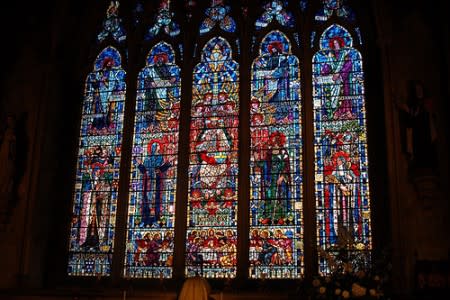An advance look at one of the next big Supreme Court cases
The Supreme Court is on its summer break, but there is already talk about a big case next year that could set a new precedent for the separation of church and state.
The topic of the case of Town of Greece v. Galloway came up at a recent Supreme Court Review at the National Constitution Center, which was also hosted by the Anti-Defamation League. (Watch video of the panel discussion here.)
Our three panelists, Erwin Chemerinsky, Frederick Lawrence and Lyle Denniston, pegged Town of Greece as a decision to watch that could alter the landscape of the concept of the separation of church and state at public facilities.
Town of Greece v. Galloway involves the legality of saying a prayer before the start of public township board meeting.
In 2008, two Greece, New York, residents sued over the town’s practice of having a prayer delivered before board meetings, in a community heavily dominated by Christian churches.
At the heart of the case is the Establishment Clause in the Constitution’s First Amendment, which deals with issues about the separation of church and state. The residents who sued say the board’s policy about the prayers was tantamount to the endorsement of a religion.
They believed the practice violated the First Amendment because of the types of prayers offered. A U.S. district court said the prayers didn’t violate the First Amendment. But the 2nd Circuit U.S. Court of Appeals in May 2012 overturned the lower court decision.
Greece is mostly Christian, and most of the prayers offered at its board meeting were Christian or came from Christian clergy within that community.
After initial complaints in 2007, the board in Greece invited a Wiccan priestess, a chairman of a Baha’i congregation, and a lay Jewish man to give prayers. But most prayers were delivered by Christians.
Constitution Daily contributor Lyle Denniston explained how the Town of Greece decision could mark a significant change of course for the Court.
“This case really illustrates what the doctrine of separation lost when Justice Sandra Day O’Connor retired, because Justice O’Connor was really the architect of the theory of endorsement,” said Denniston.
“For her, the wall of separation required the government to stay really neutral. And if the government took action, that gave to the reasonable observer the impression that the government was endorsing a particular faith practice, or a particular faith belief, that violated the First Amendment,” he said.
“The argument now that is being made and is being made very strenuously in the brief for the Town Of Greece by their lawyers is that Court needs now to go fully towards embracing Justice Kennedy’s argument, which is that it does not violate the First Amendment’s Establishment Clause unless the government coerces someone into a belief that’s alien to their own religious or non-religious point of views.”
“The Town of Greece case, I think, will really be a major test of whether or not … there is a majority [of Justices] in favor of embracing the coercion test. And I will tell you this, as any litigating lawyer in this field will tell you, it’s going to be a lot harder to prove coercion than endorsement.”
Chemerinsky, from the University of California, Irvine School of Law, said for decades the Court took the view that the Establishment Clause recognized a wall between church and state, but today’s more conservative Court may decide that the government only violates the Establishment clause to literally establish a church or to coerce religious participation.
“I think there are now likely five votes on the Supreme Court to take this so-called ‘accommodationist’ position, five votes to overrule decades of jurisprudence,” he said.
“I think Roberts, Scalia, Kennedy, Thomas and Alito all reject the notion of a wall separating church and state, and all take the view that the government violates the Establishment Clause only when it establishes a church or coerces religious participation.”
“We likely could see this in the coming term in Town of Greece v. Galloway,” he said. “What we are going to see in this case is conservatives will get five votes on the Court to finally and formally adopt the position that the government only violates the Establishment Clause only to literally establish a church or coerce religious participation. If that happens, little will be left of the Establishment Clause. The wall that separates church and state really will be obliterated.”
Lawrence, the president of Brandeis University, said the failure to recognize the separation of church and state could be bad for religious groups as well when it comes to policy decisions.
“There’s a reason for not having the 10 Commandments at a court house,“ Lawrence said. “It is bad precedent for religious groups to be having their message engaged as part of the state message. … Exactly which version of the 10 Commandments would you want in a court house? It turns out there’s more than one and there’s more than two. So maybe the better part of valor for all of us is, not ironically in spite of being people of faith, but particularly because we are people of faith, that this is a bad role for religion and not just for the state.”
Denniston said what the other panelists expressed about the importance of the Town of Greece case.
“That’s a case to really watch. It will probably be argued, I would bet, in the December sitting,” he said, based on the Court’s current case load.
Scott Bomboy is the editor-in-chief of the National Constitution Center.
Recent Constitution Daily Stories
What rights do people have to their own mug shots online?
Constitution Check: Can the government legally delay the health care mandates?


